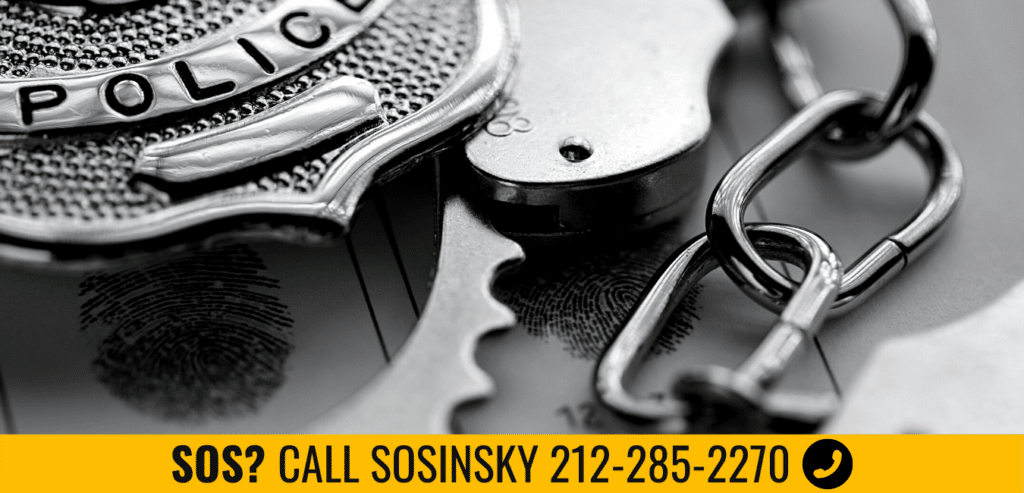NYC Narcotics Defense Lawyer
Experienced Narcotics Defense Lawyer In New York City
New York places great importance on combating the illegal manufacturing and sale of narcotic drugs. However, even the mere possession of these substances can lead to felony charges. The severity of the offense depends on various factors, including the quantity of drugs involved and whether there was an intention to distribute them.
If you are facing any type of narcotics violation in New York, seeking the assistance of a skilled NYC narcotics defense lawyer can be crucial for obtaining the best possible outcome in your case. Our qualified criminal attorney will work diligently to safeguard your best interests. We can scrutinize the police procedures that led to your arrest, challenge the validity of toxicology reports, and skillfully cross-examine the prosecution’s witnesses during the trial. For comprehensive legal support in drug-related cases, call Sosinsky Law now at (212) 285-2270 for more information and to learn more about how we can help.
Factors The Influence Federal Drug Charges
Federal drug charges encompass a multitude of distinct factors, which encompass the type of drugs involved in manufacturing, distribution, or sale. The following elements are involved in federal drug charges:
Controlled Substances
The classification of substances encompasses drugs that are subject to regulation by law in terms of their manufacture and distribution. Controlled substances are categorized into five different schedules, which apply at both state and federal levels. These schedules primarily indicate the level of regulation and the nature of the controlled substances.
Schedule 1 Controlled Substances generally exhibit highly addictive characteristics and typically lack any recognized medical use (such as cocaine and crack). As the schedule numbers increase, the level of regulation decreases. One aspect that often perplexes individuals facing federal drug charges is that marijuana is classified as a Schedule 1 drug under federal law, resulting in severe penalties that may come as a surprise to some.
Illegal Narcotics
Illegal narcotics, classified as such on the Schedule 1 Controlled Substances list, primarily refer to opiate-based drugs. These substances share three common traits: high addiction potential, lack of widely accepted medical usage, and a serious propensity for abuse. Among the drugs falling under the illegal Schedule 1 narcotics category are heroin, LSD, Ecstasy, peyote, and methaqualone. Any involvement with these substances often results in severe penalties. The penalties faced by individuals charged with federal drug crimes depend on several factors, including but not limited to:
- The type of the drug involved in the criminal activity;
- How much drug was involved;
- The location in which the person was discovered with the drug;
- Whether the person being charged had a criminal history involving drugs;
- Whether or not a weapon was displayed or exhibited, and
- Whether or not the drugs were sold to a minor.

How Does New York Punish Narcotics Possession?
Under New York Penal Law §220.03, the possession of any illegal substance, regardless of quantity, is classified as a class A misdemeanor. Consequently, a conviction can lead to a maximum jail term of one year.
As the quantity of illegal drugs increases, allegations of possession become significantly more severe. For instance, possessing just half a gram of a narcotic is sufficient to elevate a possession charge to a class D felony as per New York Penal Law §220.06. A conviction for any felony drug offense in New York may carry a mandatory minimum prison sentence.
Tougher Penalties Implemented For The Intention To Distribute
In addition to the mere possession of narcotics, the New York Penal Law also penalizes the possession of narcotics with the intention to distribute. The quantity of the drug possessed by the alleged distributor is irrelevant if the police arrest and charge a person with intent to distribute a narcotic. According to New York Penal Law §220.16, charges of narcotic distribution are always classified as class B felonies.
Cases of possession with intent to distribute often rely on circumstantial evidence, such as the presence of multiple smaller packages of the drug, scales, significant amounts of cash, packaging materials, and customer lists. Law enforcement may obtain such evidence during the execution of a search warrant and utilize it in an attempt to establish intent to distribute.
The most severe narcotic allegations involve the actual sale of the drug. In rare instances where an alleged narcotic distributor is caught in the act of selling a half-ounce or more of a narcotic drug, they may face charges of a Class A-II felony. If the amount sold exceeds two ounces, the charges may be elevated to a Class A-I felony. An experienced narcotics defense lawyer in New York City can work to mitigate the potential penalties for individuals facing such charges.
Contact Our NYC Narcotics Defense Lawyer Now
Allegations involving narcotics carry significant weight. Whether you face accusations of selling, intending to sell, or possessing illegal narcotics, these charges are nearly always classified as felonies. A conviction for narcotics-related offenses often entails imprisonment and the lifelong stigma of being labeled a felon.
Engaging the services of our skilled NYC narcotics defense lawyer can make a crucial difference in your case. They will meticulously assess the legality of the police work leading to your arrest, conduct an independent investigation of the charges, and vigorously protect your rights and best interests throughout every court appearance. Safeguard yourself by taking this important step and contacting Sosinsky Law now to learn more about how we can help.
